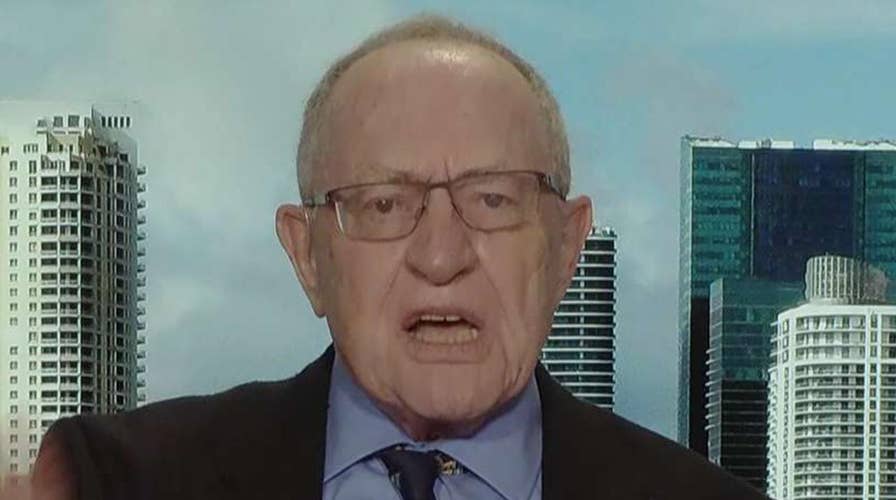Alan Dershowitz says Mueller's equivocation over obstruction of justice is a 'cop out'
How are special counsel Robert Mueller's findings on obstruction of justice different than James Comey's decision not to prosecute Hillary Clinton, asks Alan Dershowitz, Harvard law professor emeritus.
Why couldn’t Special Counsel Robert Mueller, a former Marine, make up his mind about whether President Trump is or is not guilty of obstruction of justice?
The job of a prosecutor is to make decisions. To charge or not to charge. It is not to write law review essays that lay out "on the one hand, on the other hand."
Yet the summary of Mueller’s report on Russia’s interference in our 2016 presidential election that was sent to members of Congress on Sunday by Attorney General William Barr says that Mueller reached no decision as to whether Trump engaged in obstruction of justice.
TRUMP TEAM TURNS TABLES AFTER MUELLER REPORT, CALLS FOR INVESTIGATION INTO PROBE'S ORIGIN
In law, as in life, there are close cases, about which reasonable people can disagree. But the job of the prosecutor is to decide and close cases.
What Mueller did bears a striking resemblance to what his friend, former FBI Director James Comey, did at the end of the investigation of Hillary Clinton regarding her private email server.
Comey said, as he should have, that he was not going to indict Clinton, but then he went on to say that she had been guilty of being "extremely careless." This – like Mueller's vacillating conclusion about whether President Trump obstructed justice – split the baby in half.
Both decisions gave something for Democrats and Republicans to glom onto.
In the Hillary Clinton case, Democrats emphasized the conclusion not to indict her. Republicans focused on the Comey statement about her being “extremely careless.”
Regarding Mueller’s report – which failed to make a decision on allegations of obstruction of justice by the president – Republicans are joyously welcoming the decision made by Barr and Deputy Attorney Rod Rosenstein not to indict President Trump on obstruction of justice charges.
Some Democratic House members, including Rep. Jerrold Nadler of New York, are declaring the non-exoneration of the president by Mueller as a victory and an invitation to subpoena both Mueller and his evidence.
This is precisely why prosecutors should learn that silence is golden when they've made a decision not to indict. The last thing prosecutors should do is encourage partisan political use of their statements not dealing with charges they do not file.
There is, of course, a difference between Special Counsel Mueller and ordinary prosecutors. Regulations require the special counsel to submit a report to the attorney general. But these regulations do not require the special counsel or the attorney general to make public criticisms of non-indicted subjects of the investigation, or to publicize evidence that was considered in the investigatory process.
The regulations certainly do not require the special counsel to lay out the pro and con arguments and evidence that eventually went into the "no indictment-no exoneration" conclusion.
Attorney General Barr now has a difficult decision to make. It's easy for him to redact classified and privileged material from the Mueller report. But it would gut the Mueller report if Barr decided to redact all information and evidence critical of any individual – including President Trump – who was a subject of Mueller’s investigation. I doubt he will do that, but it would be the right thing.
Alternatively, Barr might give the Trump defense team the opportunity to present its case as to why the president did not obstruct justice. In this way, the public would have an opportunity to test the evidence presented in the Mueller report against evidence and information provided by the Trump defense team.
All of this goes to show why the very institution of special counsel is so problematic. Ordinary prosecutors know the rules and generally play by them. With the special counsel, they make it up as they go along, as Mueller obviously did in this case when he provided his multiple-choice conclusion on whether Trump obstructed justice.
CLICK HERE TO GET THE FOX NEWS APP
So, two cheers for Special Counsel Robert Mueller. He came to the right conclusion about Russia – there was no collusion between Trump, his campaign or associates with Russia to win the election.
Mueller seems to have conducted a generally fair investigation. But he failed to come to a clear decision about obstruction of justice. That was his job and he should have done it.









































